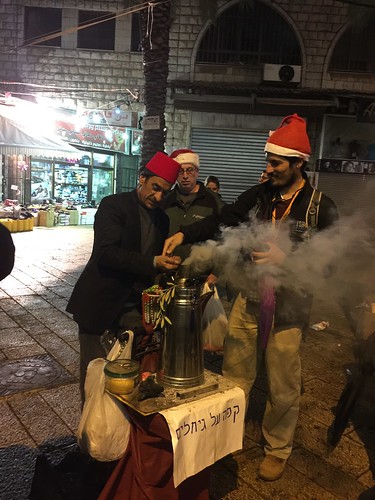Medicines for the Soul
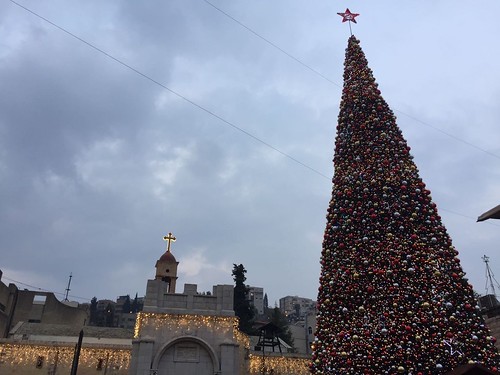
On Christmas Eve my brother invited us to go with him on an urban evening stroll in Nazareth, to experience the holiday at the historic birthplace of Christianity. My brother is a tour-guide, so it's always an experience to go for walks with him. He always knows about more than what meets the eye, and has connections with people where we visit that makes every trip with him, even to familiar places, a different experience.
Our experience started on a rather stressful note, being stuck in traffic in a very narrow, one-way downhill street that would make San Francisco's terrain look rather friendly. There was no traffic control despite very heavy flow of visitors to watch the festivities. We were stuck in what should have been a two minute drive for 45 minutes. When we finally found a 3/4 parking spot between a dumpster and another truck and got out, it was drizzling and cold, as it should be in midwinter in the Galilee.
The large square in front of the Church of the Annunciation was festive with an enormous tree-like construction with many lights and a big glowing red star on top and next to it the customary nativity scene. Many people around were wearing Santa Claus hats, blowing little annoying-sounding horns; but thankfully above it all was a recording of Fairuz singing Christmas songs. Christmas in the Middle East is certainly very different than anywhere else in the Northern Hemisphere.
I don't recall ever visiting in Nazareth, even though our family has special ties with the city. My mom's midwife, a Christian-Arab from the neighbouring village of Kfar Yasif is originally from Nazareth. Both our families have five children each (aside from me, my mom has four boys, and her midwife has five daughters). We are all in more or less the same ages. If it weren't for the strange political climate of this country, they'd all be married to each other by now...
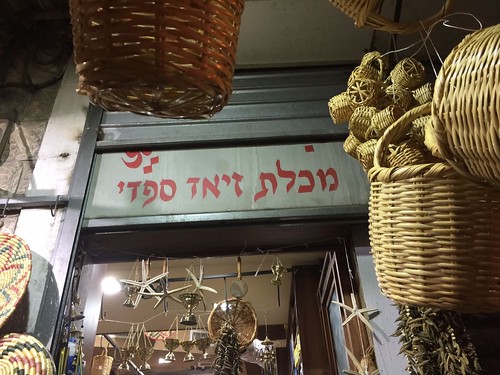
Aside from the religious spots (Nazareth's spring, bath house and historic city centre, Mary's Well and its Church, AKA Greek Orthodox Church of the Annunciation, and the Roman Catholic Basiclia of the Anunnciation (كنيسة البشار in Arabic בזיליקת הבשורה / כנסיית הבשורה) - we also went into the old souk (market) of Nazareth, which is sadly mostly dormant due to modernization. Very few people have the desire or time to find parking in narrow alleyways that were built thousand years ago and wander between merchants to compare prices and negotiate bargains. It's much easier to go to the mall and pay with plastic cards all in one place, and cart your goods to the car underground. It was very sad to see so many stores closed, behind them are beautiful old shops with arched ceilings. Some of the old apartment buildings - although mostly neglected - were used to be effendi's homes, and their ceilings are made of Cedar of Lebanon, and hand-painted by a Lebanese artist from the time of the Ottoman empire. It's a lost world, and only recently some brave entrepreneurs have taken the initiative to renovate such places and open boutique hotels, hostels and cultural centres in the ancient cities of the country. There was also a little shop in the entrance to the empty souk, full of beautiful local craftsmanship. I hope to see more such things develop.
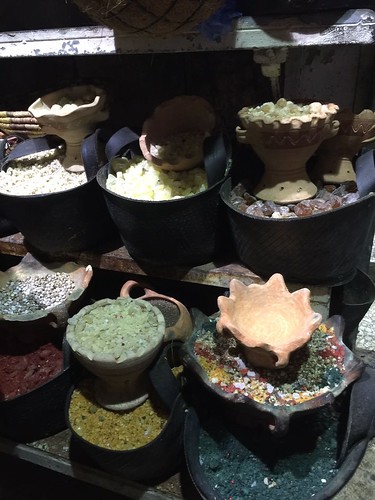
Once we reached the part of the souk that was still alive, I bought a cupful of coal-roasted chestnuts, reminiscing the cold foggy nights in Vancouver when we'd buy them from Yve's Chestnuts and warm our frozen mittens with their starchy, caramel-scented comfort. At the bottom of the hill there were some of the country's best Halawiyat (Arabic patisseries), where one should stop by for kunafeh - even if they don't have time or room in their stomach. But we were in a group with a different agenda than enjoying life on the stop - and instead continued on to Ziad Safdi's grocery store, which is really more of a magical old-fashioned herb and spice shop, that contains many folk remedies for all kinds of physical ailments, a collection of essential oils from local plants that is distilled in Nablus; speculates such as mastic gum, and mastic-flavoured chewing gum; and last but not least - assortment of medicines for the soul in the form of incense (pictured above) to be burned in special clay pots. You could find there anything from frankincense and myrrh to colourful and sparkling blends typically burned in churches.
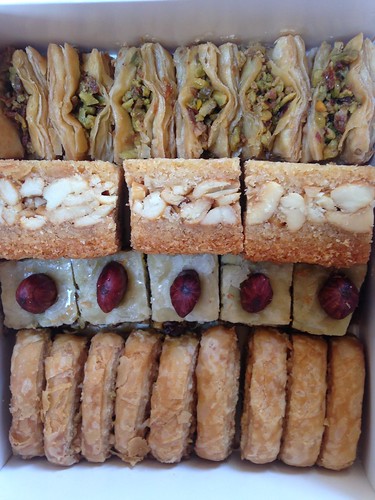
As we continued on, we stumbled upon other interesting merchants, such as this man who brews coffee in a special pot decorated with olive branches and misbaha (prayer beads) that has hot charcoal in a pipe in the middle, and sends impressive steam to the air. We continued to El Babour Mill - Nazareth original steam-powered miller (the name is a mispronunciation of the English word "vapour") - now more of a live museum for old mills, sieves and pieces of history from the family that keeps this tradition - and a spice and candy shop. I bought there a jar of black-coloured nigella spread, and green frikeh (charred green wheat berries). The tour ended there and once everyone spread to all four direction of the winds, my brother, daughter and I stopped at a more humble bakey and bought some spinach-filled sambusac, date-filled sesame balls, and karakish - savoury cookies that look like hard flatbreads studded with fragrant seeds of sesame and fennel.
